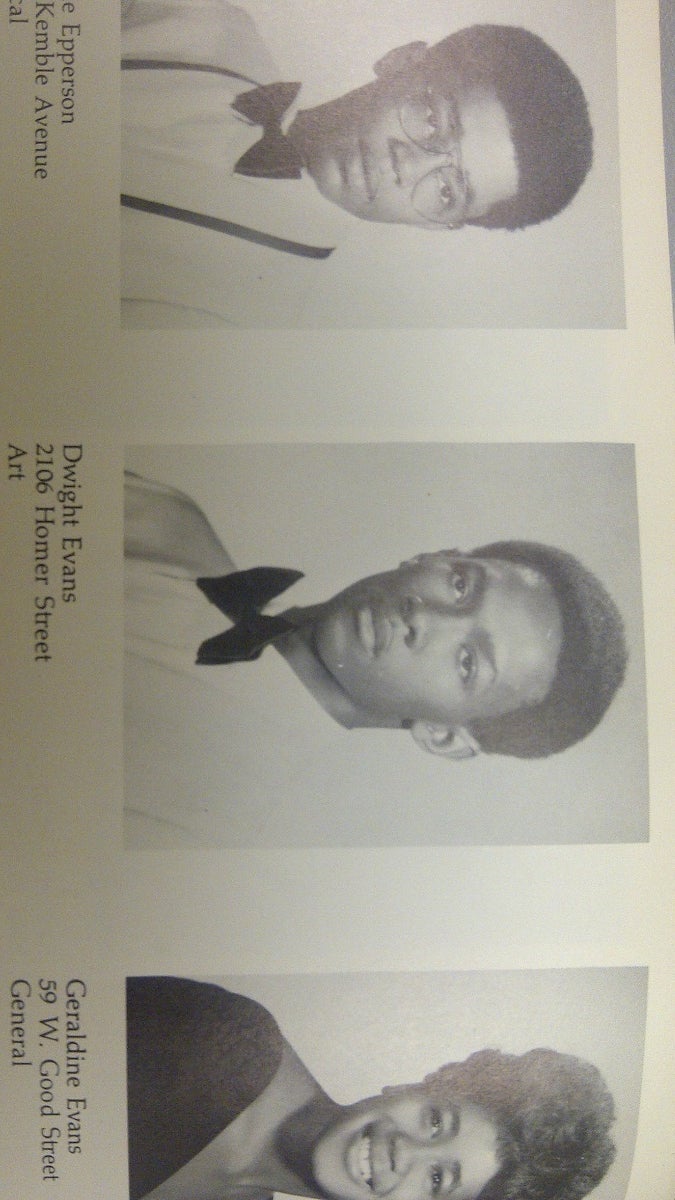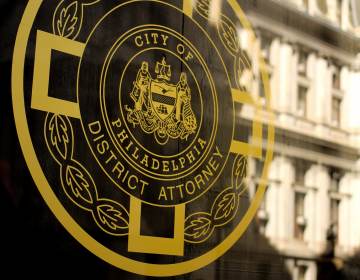The final month: GHS grad Dwight Evans says officials did not prepare for inevitable change

Dwight Evans, pictured in Germantown High School's 1971 yearbook. (Brian Hickey/WHYY)
Of the 16 accomplishments that state Rep. Dwight Evans lists on his official website, two relate to education.
The first: the West Oak Lane representative helped get legislation passed to stave off a threatened Philadelphia School District shutdown in 2001.
The second: “Evans was instrumental in securing the passage of Pennsylvania’s Charter School Law” four years earlier.
Since charter schools factor into debates about the school-district’s ongoing struggles, and the fact that he attended Germantown High School from 1968 to 1971, NewsWorks asked Evans to reflect on GHS’ closing through the prism of work he did to establish charter schools in Northwest Philadelphia and beyond.
Leafing through his old yearbook at a table on which an old-school GHS Bears hat rested, Evans spoke about memories of his time at the school, and how legislators saw these struggles, namely the fiscal ones, coming but failed to take necessary action.
Here’s what he had to say:
About the GHS experience
“I grew up 128 Tulpehocken St. I went to church right there on Haines Street. Went to Fulton [Elementary], which is also closing. That Germantown High area is like the neighborhood I grew up in, a neighborhood where people truly believed we are our brothers’ and sisters’ keepers.
“I had a very positive experience with the students and the teachers. I didn’t get heavily involved with the activities because I was working at Roman Hospital, though. Played two years of football, left end, my freshman and junior years.
“Our prom was held at the Ivory Star Inn in Pennsauken (NJ). Afterwards, I drove to Atlantic City since I had just gotten my license.
“It was the gang era. They had just eliminated lunch time, since that’s when problems sometimes arose. Classes ended around 1 p.m. Gratz kids would come up to the area so sometimes there were fights, but it was not as big of a problem then. I had to walk through some bad areas to get to school, but it wasn’t a problem.
“Did I know I had a future in politics when I was at Germantown High? I think I knew it was a possibility.
“[The late state Rep.] Dave Richardson was a few years above me. I saw him working to stop the fighting at that time. I saw that people looked to him as a positive influence. I know I did.
“Back then, you wanted to go to Germantown. I came out of Leeds. (He points out James Finney in yearbook). His father worked with my father at a moving company. Mike Evans lived across the street. (Pointing to yearbook photos of classmates whose parents were teachers and school officials)
“There’s no vested interest like that today. Superintendents don’t send their kids to Germantown.
On finances and school funding
“I don’t think that there is a quick fix to the problems in this school district. We’re always behind with schools that are funded by property taxes. That’s not best funding source. It’s an antiquated, unfair system. If the wealth is not there (in a community), then it becomes a problem.
“What are the expectations of the school system? Public education was created in a different era. Factories disappeared. The department stores disappeared. It was more vibrant (along Germantown’s business corridors) than what is there today.
“The economy could afford the dropout back then, it could absorb the individual with a job. That is not the case anymore.
“All these changes have been happening for a long period of time. I don’t think the people — the elected officials and community leaders — paid attention to that shift.”
On charter schools (and whether the shift led to GHS closing)
“Charters are public schools, just contracted out. The money follows the kid. I see it as a matter of school choice.
“I went to three different middle schools: Wagner, Roosevelt, Leeds. We used a different home address to get me out of Wagner because my mother was not satisfied with me going there. That was a version of school choice, too.
“Not everybody could get into Central [High]. When we moved from North-Central Philly to Germantown, I went to Fulton. Mrs. Burrows, my fifth-grade teacher, had 40 kids in the class, but she was a good teacher.
“Charter schools just give people an option. They’ve enhanced the public-school system. I look at it like Gimbels or Lit Brothers department store. Gimbels or Lit is your traditional public school; Target is a charter.
“The constant tension [surrounding the school closings] was counterproductive.
(He pulls out folders with various educational initiatives he’s supported or introduced in Harrisburg with named like “Ticket to the Future”)
“I first ran on economic development and education (issues). We made steady progress on some of these things, but nobody wanted to pick it up. We wanted to change the system because the system was broken, but nobody wanted to do that.
“Nobody was asking ‘Why are we losing students?’ You didn’t have to be a rocket scientist to have seen that change was coming. It has always been coming.
“As political leaders, we weren’t ahead of the curve. I think the problem was that parents and kids depend on their elected officials to be on top of it. The problem is, we weren’t on top of it.
“There could have been some alternatives [to GHS and other schools closing], but the system is such that we just need to have this happen now.
“Nobody is listening to people talk about change. Look at Chicago, they’re closing more schools than we are. Who’s from there? The President, and [former Obama chief-of-staff] Rahm Emanuel’s the mayor. If the President of the United States is from Chicago, and they just lost 50 schools, what does that tell you? This is the stuff we should have been talking about years ago.
“It’s about more than funding. We need fundamental change. … I realized a long time ago that stuff had to change, but the crosswinds weren’t there for it to happen.”
On what’s to come
“Germantown High closing is going to have a huge economic impact on that area. There were no economic-impact studies done, and that’s where [the school district] failed.
“Who are the casualties? The people of the community who see that all this stuff happened, but still have no answers as to what’s next. [City Councilwoman] Cindy Bass and [state Rep.] Stephen Kinsey really walked into a tough situation there.
“As for potential problems between students from GHS and MLK, they need to do the prep work. The parents and community have got to be involved.
“And, King has to be working out in order to survive. The way things are now with the district, [King] has to impress. But, there’s no quick answer to a greater problem. It’s just not there. Nobody wants to hear that.
“People may ask, ‘Well, Dwight, what did you do?’ Well, I was trying to do a lot, but the Democrats didn’t want to hear it, and the Republicans went too far in another direction.
“It’s always been a broken situation for public schools. The question we now face is how do we defend it, how do we fix it? Public education is a part of democracy. You have to have some form of public education. But, we need to redefine it, because it’s not the 1920s, thirties or fifties anymore.
“Yes, I saw this coming. Everything must change. That’s just the truth: Nothing remains the same. I’d love to have an afro and be 150 pounds lighter again, but those things will never happen.”
As the final day of Germantown High School’s 99-year history approaches — the Class of ’13 will don caps and gowns on June 19 — NewsWorks will present a series of stories including interviews with grads and former students.
To that end, we’re asking you to send your memories via email (subject line: My GHS Memories), the comments section or call (215) 351-1293.
WHYY is your source for fact-based, in-depth journalism and information. As a nonprofit organization, we rely on financial support from readers like you. Please give today.




